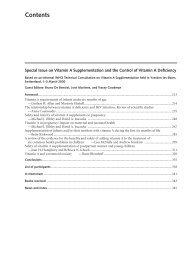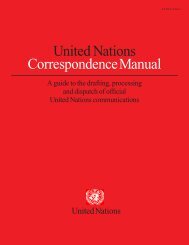Implementing food-based dietary guidelines for - United Nations ...
Implementing food-based dietary guidelines for - United Nations ...
Implementing food-based dietary guidelines for - United Nations ...
You also want an ePaper? Increase the reach of your titles
YUMPU automatically turns print PDFs into web optimized ePapers that Google loves.
Trade, development, and regulatory issues in <strong>food</strong><br />
Sunder Ramaswamy and Brinda Viswanathan<br />
Abstract<br />
Trade in <strong>food</strong> and animal products has increased several-fold<br />
in the past decade, and simultaneously regulations<br />
governing the movement of such products across<br />
national boundaries have also increased. The present<br />
study reviews harmonization in <strong>food</strong> trade regulation by<br />
focusing on nutritional aspects to understand its role in<br />
enhancing world trade on the one hand and consumer<br />
interest and welfare on the other. Harmonization to a<br />
large extent brings in more regulation from the developed<br />
world acting through their governments, consumer<br />
organizations, and multinational companies; it does not<br />
seem to address, in general, the concerns of the large segments<br />
of the poor population <strong>for</strong> whom agriculture and<br />
<strong>food</strong> trade are the main sources of livelihood. There is a<br />
lack of quantifiable estimates of the loss in well-being of<br />
the disadvantaged. However, there is substantial research<br />
focused on the potential harm to developed nations as<br />
a result of nonadherence to the rules. Clearly, lack of<br />
adequate infrastructure, resource constraints, and weak<br />
institutions not only result in poor <strong>food</strong> safety regulation<br />
within developing countries but also remain barriers to<br />
realizing the greater potential benefits from increased<br />
trade. Harmonization of standards would have some<br />
losers and some winners, but to make it more inclusive,<br />
scientific knowledge alone may not be adequate; social<br />
and cultural aspects also need to be considered, since<br />
<strong>food</strong> systems differ among regions, with varying preferences,<br />
local resource availability, and levels of economic<br />
development. Improvement in governance in many<br />
countries not only would ensure better participation in<br />
international rule-making and the negotiation process<br />
<strong>for</strong> fairer trade but also would result in effective domestic<br />
legislation to ensure safer health <strong>for</strong> citizens, resulting in<br />
higher overall well-being.<br />
Sunder Ramaswamy is affiliated with Middlebury College,<br />
Middlebury, Vermont, USA; Brinda Viswanathan is affiliated<br />
with the Madras School of Economics, Chennai, India.<br />
Please direct queries to the corresponding author: Sunder<br />
Ramaswamy, Department of Economics, Middlebury College,<br />
Middlebury, VT 05753, USA; e-mail: sunder.ramaswamy@<br />
middlebury.edu.<br />
Key words: Food safety, SPS and TBT agreements,<br />
trade in <strong>food</strong><br />
Introduction<br />
At the dawn of this century, the value of international<br />
trade in <strong>food</strong> exceeded US$400 billion per annum (with<br />
the estimated total value of international trade being<br />
US$6.5 trillion) and accounted <strong>for</strong> on the order of 500<br />
million tons of <strong>food</strong> products, and on average the trade<br />
has continued to grow significantly since then [1]. The<br />
dominant share belongs to the developed countries in<br />
terms of both exports and imports. The trade share of<br />
developing countries has increased over the years, but<br />
developing countries remain mainly exporters of primary<br />
products and importers of processed <strong>food</strong>. The<br />
present trade scenario is complicated by several factors:<br />
the presence of World Trade Organization (WTO) rules<br />
since its inception in 1995 on the one hand, and innovations<br />
such as genetically modified <strong>food</strong>s and <strong>food</strong><br />
<strong>for</strong>tification, with lowered immunity of the populations<br />
in developed countries on the other. The complication<br />
in the trading rules arises from the varying standards<br />
set by importing nations. Most often the differences<br />
between trade and regulatory standards arise from the<br />
lack of concrete scientific evidence on the potential<br />
health impacts, and there<strong>for</strong>e the justification of such<br />
standards is questioned. Thus, smooth facilitation of<br />
trade calls <strong>for</strong> a harmonization of <strong>food</strong> safety standards<br />
that are transparent and easy to comply with.<br />
International <strong>food</strong> safety standards have prevailed <strong>for</strong><br />
a very long time and so has trade in <strong>food</strong>; but why the<br />
need <strong>for</strong> harmonization now? The world population<br />
will reach 8 billion by 2020, with about 96% of growth<br />
concentrated in the developing world. Overall increases<br />
in population and, in particular, increases in urban<br />
population pose great challenges to the <strong>food</strong> systems<br />
of the world, from production to distribution to consumption.<br />
With greater emphasis on trade as an engine<br />
of growth and poverty reduction, developing countries<br />
around the globe are choosing (or in some cases, are<br />
<strong>for</strong>ced) to liberalize their trade regimes. Trade in <strong>food</strong><br />
Food and Nutrition Bulletin, vol. 28, no. 1 (supplement) © 2007, The <strong>United</strong> <strong>Nations</strong> University. S123




